Plantega’s Nil Zacharias: ‘I See Our Sandwiches Becoming A National Phenomenon’
11 Mins Read
Nil Zacharias, founder and CEO of Plantega, talks bodegas, BECs, New York City, plant-based struggles, and plans to expand across the US.
The first thing I did when I got to New York City was order a burrito.
It was 2pm, so naturally I was craving breakfast. Chorizo from Abbot’s, a scramble from Zero Egg, nacho cheese from WayFare, some hash browns, some spinach, some avo.
It felt like the Avengers of vegan food, if you will, born out of a truly innovative concept by Nil Zacharias. He is the founder and CEO of Plantega, a company turning bodegas – etched in the fabric of New York City – vegan-friendly.
Plantega partners with vegan food producers across the country – from plant-based meat makers like Prime Roots, Karana, Daring, Umaro, and of course, Abbot’s, to non-dairy innovators such as Stockeld Dreamery and Numu and egg alternative makers Zero Egg and Fabalish – and uses their products to veganise bodega classics.
Instead of opening brick-and-mortar stores, it equips the city’s existing bodegas with a deli menu that turns a combination of these offerings into NYC favourites – think butter rolls, chopped cheeses, Philly cheese subs, BECs, and breakfast burritos.
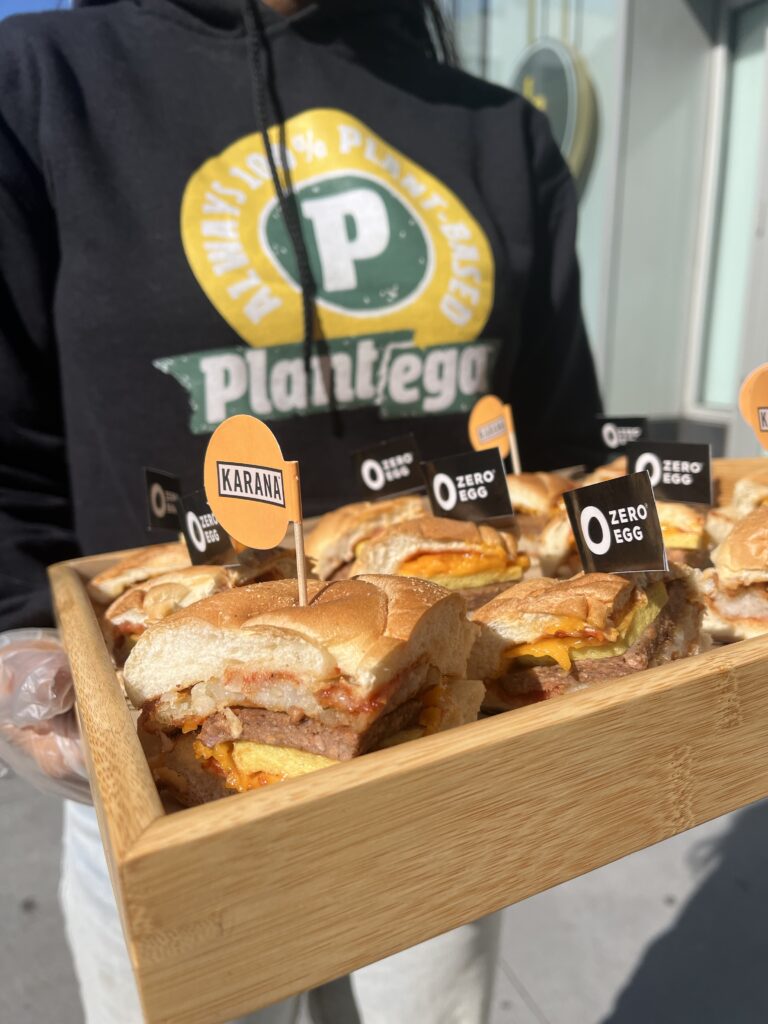
There are more than 13,000 bodegas in the Big Apple. With many open 24 hours or until late, Zacharias calls them a “lifeline that all New Yorkers depend on”. Mostly immigrant-owned, these independent businesses outnumber grocery stores in several neighbourhoods, and whip up deli classics with not much more than a grill, a fryer, and a deli counter.
Zacharias, a former ad exec and marketing consultant, started Plantega as a pilot programme in three bodegas in November 2020. This was the height of the pandemic, and bodegas’ status as essential businesses became ever more important as restaurants closed. The trial concept featured the hybrid foodservice and retail approach, with branded fridges that stocked the plant-based products, and a deli making use of them in a nostalgic yet novel way.
“We learned very quickly that people loved the sandwiches, and the retail products were a harder sell because of a range of factors, from the shopping habits of consumers to space constraints in the stores,” Zacharias tells Green Queen, “So we abandoned that approach fairly quickly when we officially launched the company later in 2021.”
Initial pushback from cooks gave way to customer uptake

For Zacharias, making bodegas inclusive to vegans wasn’t just because there was an inherent lack of such options, but also because he wanted to show that this could retain the cultural meaning of a dish, just with a change of ingredients.
“And I think it really resonated with people because we did not try to do it in a gimmicky way that hijacked the culture,” he says. “Instead, we worked from the ground up to empower the bodega owners to buy into our brand and approach and get their customers to embrace their favourite sandwiches, just made better – with better-quality ingredients, and better health and environmental outcomes.”
How receptive were bodega owners initially? “Our first conversations with bodegas were pretty simple. We asked them if their consumers were asking for more vegan or vegetarian options. The answer was always yes,” he says. “We then followed up with a question about what the plant-based options were on their menu. And they would almost always point to one or two options that usually included a bland veggie sandwich of sorts.”
This is when the Plantega team would show bodega owners the vegan menu, asking them if they’d like to see something like that in their store. “And then it really came down to explaining to them how they would make money doing it and how Plantega functioned as the easy button to add plant-based menu items in their bodegas,” explains Zacharias.
“Once they tasted the sandwiches and grasped what the model really meant, and how Plantega made this very seamless and easy for them, our concept really just sold itself,” he adds.
That doesn’t mean there wasn’t any pushback initially. “In the first year, we really had to work hard to convince bodegas to carry our menu and partner with us,” he recalls. But this was more down to the fact that they wanted a discount on their first order so they could mitigate upfront costs and risks, rather than the fact that bodega owners doubted the concept’s value or demand.
“Because our model involves selling an entirely plant-based menu under the Plantega brand name alongside their regular deli menu, in some cases, we did receive pushback from deli cooks during the first few weeks,” says Zacharias.
“They were usually not happy about having to get trained on a whole new menu and use the plant-based ingredients we supplied for it. Plantega did add a new layer of complexity to their jobs when an order came in for a plant-based sandwich, and not every cook was excited about the extra work.”
Customers, on the contrary, ate it all up. “Most were intrigued by the attractive new menu added at the deli. And the reason we probably faced little to no pushback from them is that they still had the choice to pick anything they wanted from the regular deli menu,” he points out.
“We weren’t forcing them to make a change, but were doing our best with our branding (via posters and attractive signage, as well as strategic placement of our menu) to nudge customers to try Plantega.”
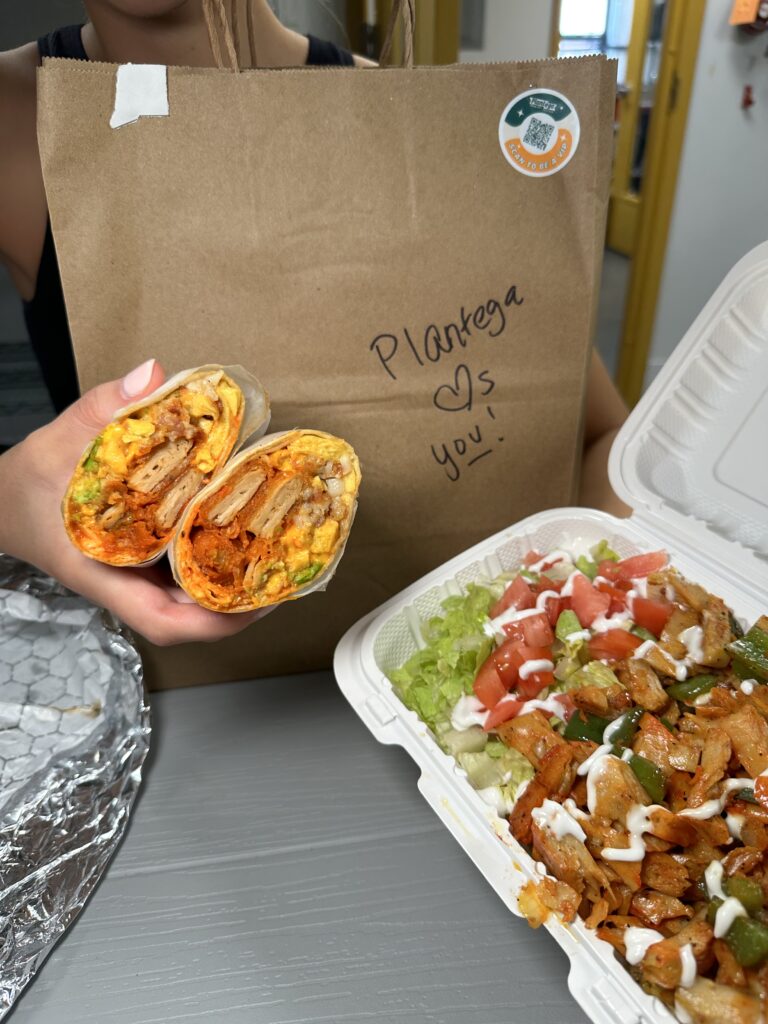
The Plantega business model
To take the load of veganising bodegas’ bread and butter items (literally) off of their owners, Zacharias and his team develop the entire plant-based menu themselves, drawing inspiration from NYC deli sandwiches and creating new dishes to showcase the plant-based ingredients as best they can.
“Our in-store menu includes 14 items, and our delivery menus feature 40+ items,” says Zacharias. Plantega supplies all the products to bodegas, organises them on their counters, trains their cooks, sets up the menus and signage, performs quality checks, and markets the stores. It also processes future orders once bodegas sell out of products, and onboards them onto delivery apps like Uber Eats, DoorDash, and Grubhub.
Due to the nature of this model, “the menu has to be consistent at every touchpoint”, says Zacharias. Plantega is currently in 56 bodegas across the city’s five boroughs, and recently opened a flagship kitchen to offer direct delivery and open its model up to corporate catering and large events.
“Because we are so widespread across the city, our primary criteria now is finding a store that’s in a neighbourhood that doesn’t have a Plantega location,” says Zacharias.
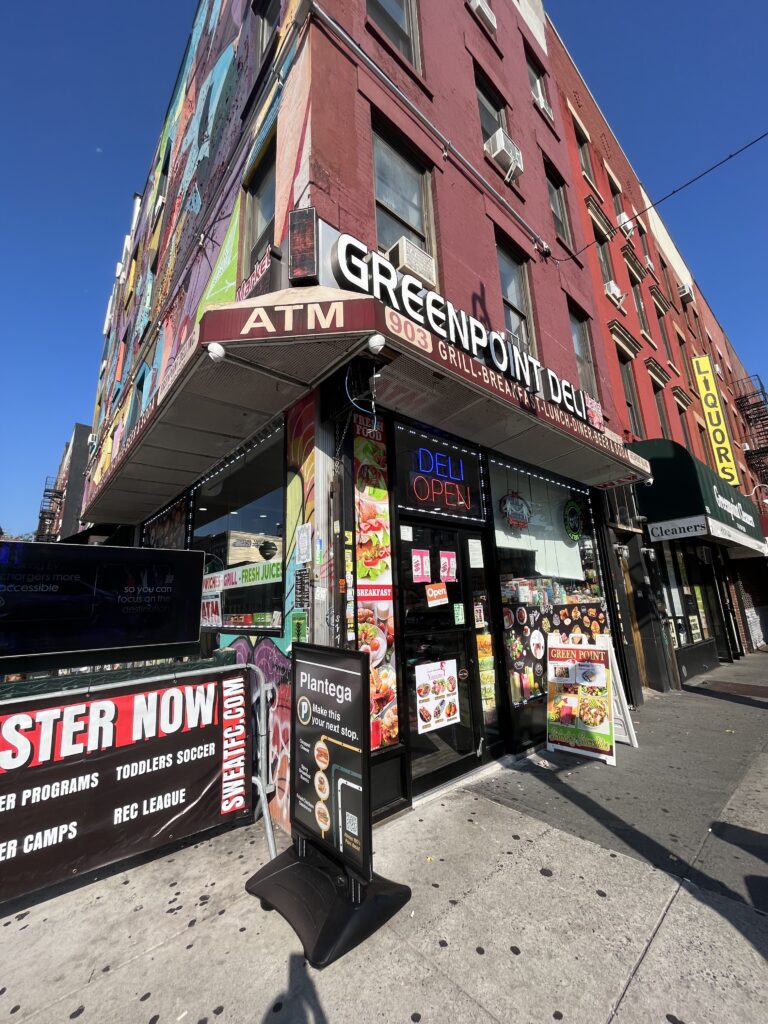
“We then analyse whether the store has a successful deli business, as well as other factors like storage space for our products, cooperative cooks that are willing to get trained by us, a clean and professional operation, and most importantly, a store owner who understands the nature of our partnership and is committed to working with us to make plant-based food more accessible to their customers.”
So how does the business make money? Plantega takes supply fees and distribution commissions from the bodegas, participation fees from the brands that offer their product, and revenue from delivery sales via bodegas. It will now also generate revenue from the new catering kitchen.
Of course, not everything has worked. The fridges that were part of the pilot in 2020 are now gone, and the menu has been updated to better reflect what its target consumers want.
“One of the most important lessons we learned pretty early in our journey was that trying to educate consumers about the health and environmental benefits of plant-based food as a way to convince them to choose something from our menu didn’t work,” says Zacharias, echoing a rhetoric floated by leading industry executives.
“On the other hand, creating a fun, uplifting, and approachable brand that gets people excited about our food made us a recognised and loved plant-based brand across New York City.”
What’s in it for the plant-based brands?
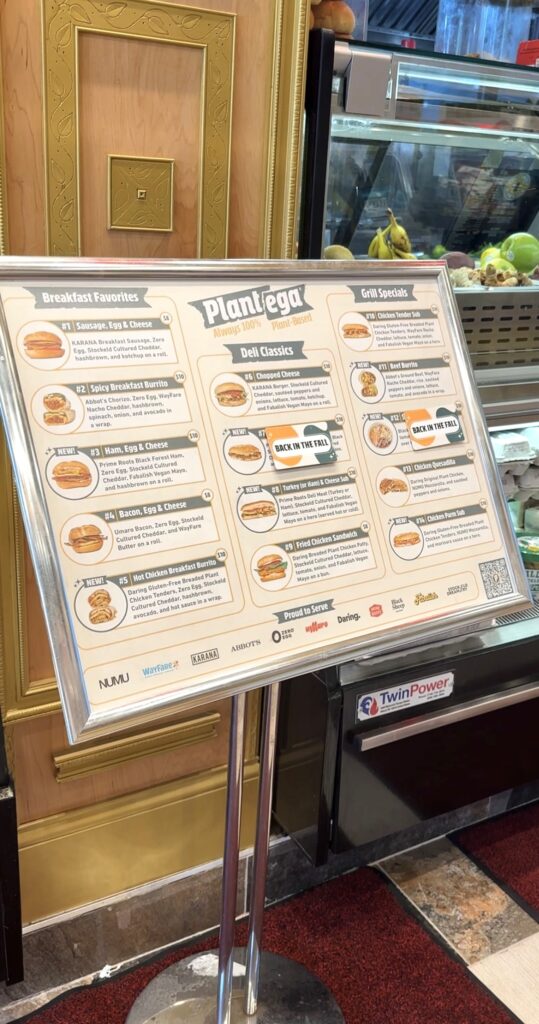
Plant-based meat – and the vegan sector in general – has had it tough over the last two years. Sales have dropped off, as has venture capital, while consumers have expressed dissatisfaction with overprocessing, high markups, and the taste of meat analogues.
Retail sales dropped by 12% in 2023, but in foodservice, the decline was only 6%. Consumers tend to be more receptive to plant-based analogues in restaurants, where the possibility of cooking a vegan burger badly is much lower than at home.
“I think the industry has a trust and discoverability challenge that can be alleviated if we get it right in foodservice,” notes Zacharias. “Foodservice has some inherent advantages that make it more accessible to new consumers. Here, plant-based products are presented in a familiar environment and context, which reduces the barrier to trial.
“Professional cooks get to showcase the products in the way they are intended to meet the needs and specific tastes of their customers. This helps drive consumer trial in a convenient way and can go a long way in making a great first impression about new products, and can change any preconceived notions consumers have of the taste and texture, as well as the functionality of the products.”
He adds: “Working with a range of brands and showcasing them under our platform has been a big part of the Plantega model since we launched.” By partnering with Plantega, these companies open up new distribution and trial opportunities via field marketing activations.
“We’ve not only sourced our ingredients from multiple brands, but have also been intentionally brand-forward in our branding and marketing,” says Zacharias. On the menu, you’ll see the company each product is from, which is complemented by signage around the store sporting brand logos.
“We also host various sampling and community events in NYC throughout the year to showcase our menu items and specifically talk to consumers about the ingredients used and the brands we partner with. Lastly, we create content for our social media channels that feature our brand partners, along with consumer reactions and feedback on their products.”
Zacharias reveals that the bestselling dish on the menu is the chopped cheese sandwich, which pairs the Karana burger with Cultured Cheddar cheese from Stockeld Dreamery. Other popular items include a BEC with Umaro bacon, Zero Egg, and Stockeld Cheddar, turkey/ham cheese subs featuring Prime Roots’s mycelium meats, and the aforementioned spicy breakfast burrito.
Working with so many brands at once may seem challenging, but Zacharias says that hasn’t been the case, because each of the 11 companies brings something different. “They understand that Plantega is a unique platform in a key US market that features their products in a complementary way, unlike any other sales channel,” he says.
“We are driving sales, but we’re also consistently connecting with new consumers who are passionate about our iconic NYC Deli-style sandwiches and discover new and emerging brands as a result.”
Plantega embedded in New York City’s plant-based push
“Bodegas are as much an iconic symbol of New York City as our vibrant parks, subway system, or skyscrapers,” says Zacharias. “In a city where change is the only constant, bodegas have stood the test of time. They’ve witnessed neighbourhoods transform, seen trends come and go, yet they remain steadfast, with deli counters serving up comfort wrapped in wax paper.”
And despite soaring real-estate prices driving some bodegas out of business or forcing owners to pivot to other kinds of retail establishments, he believes “there is no sign that this cultural icon of the city is going extinct anytime soon”.
Veganism isn’t going anywhere either, especially in New York City. Since food makes up a fifth of its greenhouse gas emissions, the local government is working to reduce emissions by a third by 2030. All 11 public hospitals, for example, now offer plant-based meals as the default choice, a campaign that has witnessed great success. The Plant-Powered Fridays campaign at public schools, meanwhile, has led to a 28% reduction in emissions
It’s part of embattled mayor Eric Adams’s drive to green up the city. He follows a plant-forward diet himself, and celebrated his mayoral win in 2021 at a Plantega location. Across the US, 1,400 mayors have signed a resolution to promote a shift to plant-based diets, taking a leaf out of Adams’s playbook.
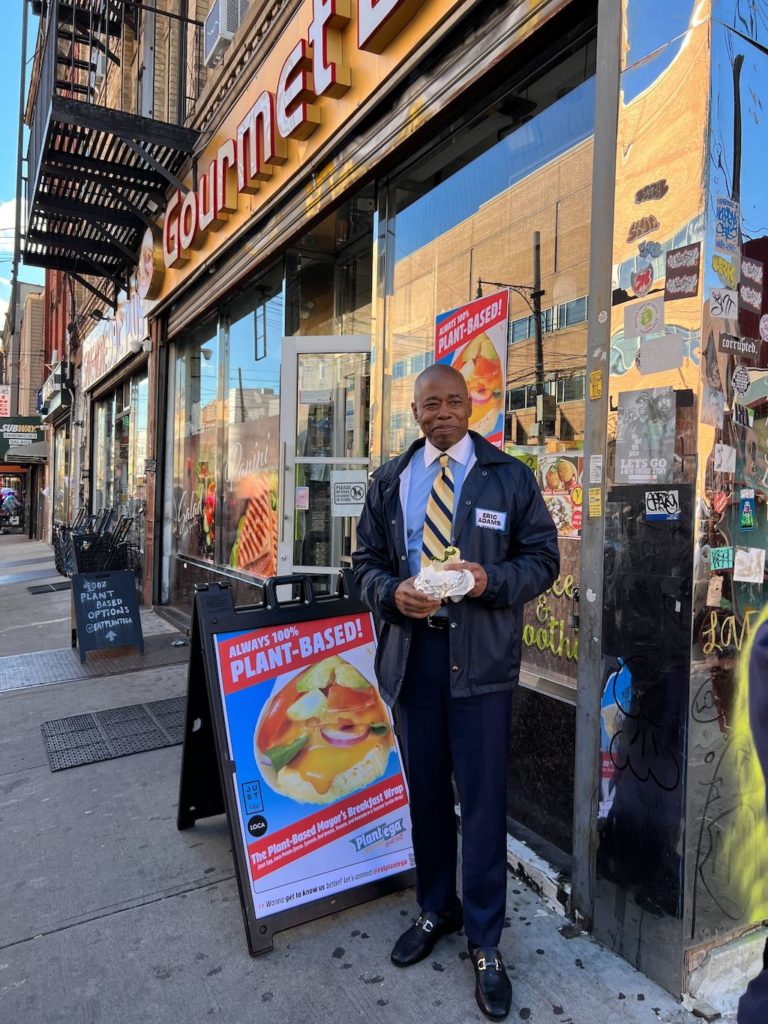
The NYC mayor also kickstarted the Plant-Powered Carbon Challenge earlier this year, with non-profit Greener by Default helping partners track emissions and share best practices on designing plant-forward menus. Challenging businesses to lower food-related emissions by 25% by the end of the decade, it has been taken up by Columbia University, The Rockefeller Foundation, catering giant Aramark, and the US Open, among others.
“It is incredible to see the NYC Mayor’s Office of Food Policy make plant-forward eating such a key pillar in their strategy to increase food security, promote access to and consumption of healthy foods, and support economic opportunity, environmental sustainability, and equity in the food system,” says Zacharias.
“I strongly believe that shifting towards a predominantly plant-based food system can have a profoundly positive impact, and I hope what’s happening in New York City encourages other local governments to take similar steps.”
Plantega to expand nationwide
Plantega’s evolution over the last few years has solidified Zacharias’s belief that consumers still want plant-based food, as long as it’s “fun, familiar, and satisfying”.
Among its major growth drivers now is the Plantega Kitchen & Catering division, which he describes as “highly tech-enabled”. It has been optimised for local D2C deliveries, as well as citywide catering clients looking for better vegan options for all meal types.
“Recognising that a significant number of meals in New York City are consumed within private institutions such as corporate offices and event venues, Plantega sees a tremendous opportunity to amplify our impact,” notes Zacharias.
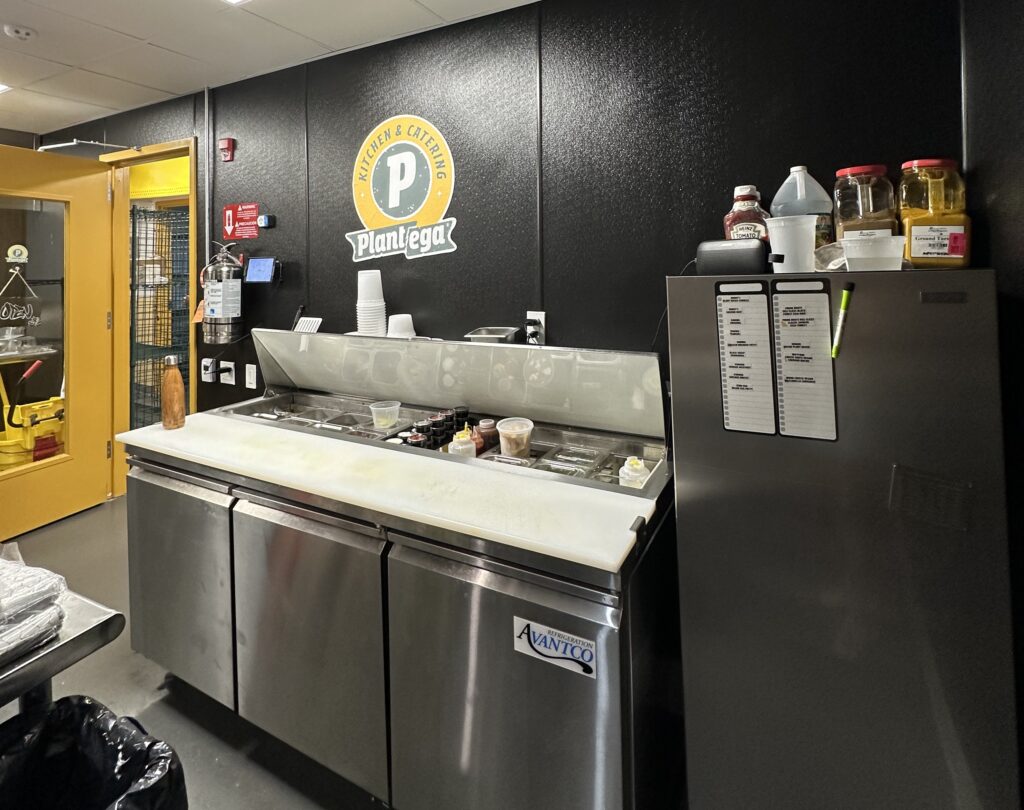
“This launch is timely as the return-to-office trend drives a catering boom in workplaces, and the climate crisis makes it imperative for organisations to reduce their food-based carbon emissions,” he adds. Perhaps most notably, he says the kitchen will “serve as a blueprint for our plan to scale the Plantega brand and operations outside of New York City.”
That’s part of the business’s five-year plan. “I foresee quick, comforting New York Deli-style sandwiches becoming a national phenomenon, and Plantega – with our authentic brand story having started in the deli counters of bodegas around New York City – being the brand that makes it happen,” outlines Zacharias.
“Plantega’s Chopped Cheese, Bacon, Egg & Cheese and other sandwiches will be sold in multiple cities across the US, through our own kitchens and via licencing partnerships,” he adds. “People will eat our food primarily because they love how it tastes and how the Plantega brand makes them feel. The fact that everything is plant-based will just be an attribute that makes it even better.”



